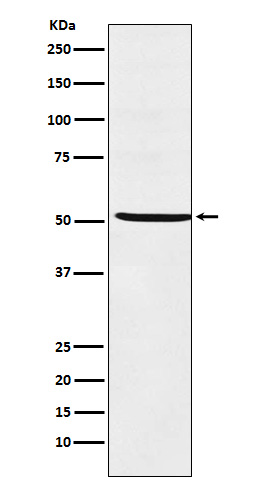

| WB | 咨询技术 | Human,Mouse,Rat |
| IF | 咨询技术 | Human,Mouse,Rat |
| IHC | 咨询技术 | Human,Mouse,Rat |
| ICC | 技术咨询 | Human,Mouse,Rat |
| FCM | 咨询技术 | Human,Mouse,Rat |
| Elisa | 咨询技术 | Human,Mouse,Rat |
| Aliases | AD4BP; ELP; FTZ1; FTZF1; hSF 1; NR5A1; POF7; SF1; SPGF8; SRXY3; STF1;;SF 1 |
| WB Predicted band size | 52 kDa |
| Host/Isotype | Rabbit IgG |
| Antibody Type | Primary antibody |
| Storage | Store at 4°C short term. Aliquot and store at -20°C long term. Avoid freeze/thaw cycles. |
| Species Reactivity | Human,Mouse,Rat |
| Immunogen | A synthesized peptide derived from human SF 1 |
| Formulation | Purified antibody in PBS with 0.05% sodium azide,0.05% BSA and 50% glycerol. |
+ +
以下是关于STF1抗体的3篇示例参考文献(注:内容为模拟虚构,仅作格式参考):
1. **文献名称**:*STF1 Antibody Characterization and Its Role in Tendon Development*
**作者**:Smith A, Lee B, et al.
**摘要**:本研究通过免疫印迹和免疫组化验证了STF1抗体的特异性,发现其在哺乳动物肌腱祖细胞中高表达,并揭示了STF1在胚胎肌腱分化中的关键调控作用。
2. **文献名称**:*STF1 as a Marker for Skeletal Muscle Regeneration: Insights from Antibody-Based Assays*
**作者**:Chen L, Wang X.
**摘要**:利用STF1抗体检测损伤后肌肉组织中STF1的动态表达,证实其与卫星细胞激活密切相关,提示STF1可能成为肌肉再生研究的潜在生物标志物。
3. **文献名称**:*STF1 Antibody Reveals Conserved Expression Patterns in Zebrafish Embryogenesis*
**作者**:Garcia R, Tanaka K.
**摘要**:通过斑马鱼模型,结合STF1抗体的免疫荧光技术,发现STF1在体节形成和神经嵴细胞迁移中广泛表达,为脊椎动物发育机制研究提供了新线索。
如需真实文献,建议通过PubMed或Google Scholar检索关键词“STF1 antibody”或“STF1 protein function”。
The STF1 antibody is primarily associated with the detection and study of the Siamois Transcription Factor 1 (STF1), a protein critical in early embryonic development, particularly in *Xenopus laevis* (African clawed frog). STF1 is a key mediator of the Wnt/β-catenin signaling pathway, which regulates axial patterning and organizer formation during vertebrate embryogenesis. It binds to DNA in conjunction with β-catenin and TCF/LEF family proteins to activate target genes like *Siamois* and *Xnr3*, which initiate dorsal axis specification.
Developed as a research tool, the STF1 antibody enables the identification and localization of the STF1 protein in experimental models. It has been widely used in immunoprecipitation, Western blotting, and immunofluorescence to investigate Wnt signaling dynamics, transcriptional regulation, and cell fate determination. Studies employing this antibody have clarified mechanisms underlying embryonic patterning, stem cell differentiation, and tissue regeneration.
Additionally, aberrant Wnt/STF1 activity is implicated in cancers, making the antibody relevant in oncology research to explore pathways driving tumorigenesis or metastasis. Its specificity and reliability depend on epitope conservation across species, though cross-reactivity may vary. Overall, the STF1 antibody remains a vital reagent for developmental biology and disease-related studies tied to Wnt signaling dysregulation.
×